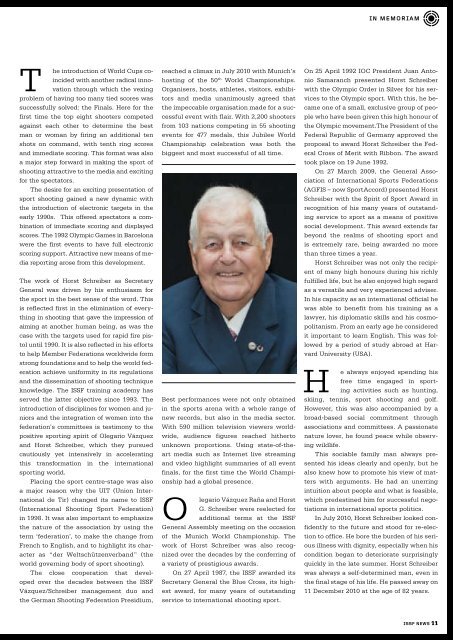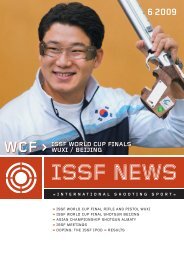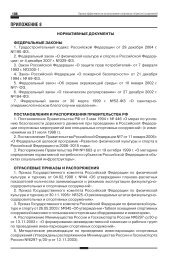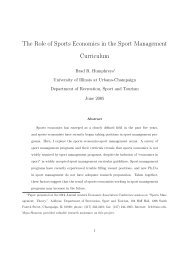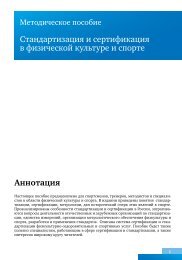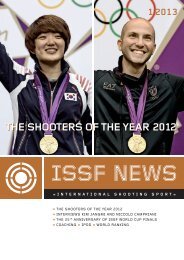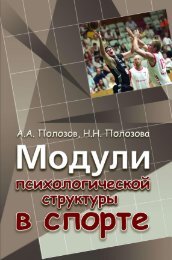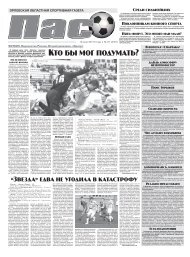Create successful ePaper yourself
Turn your PDF publications into a flip-book with our unique Google optimized e-Paper software.
T<br />
he introduction of World Cups coincided<br />
with another radical innovation<br />
through which the vexing<br />
problem of having too many tied scores was<br />
successfully solved: the Finals. Here for the<br />
first time the top eight shooters competed<br />
against each other to determine the best<br />
man or woman by firing an additional ten<br />
shots on command, with tenth ring scores<br />
and immediate scoring. This format was also<br />
a major step forward in making the sport of<br />
shooting attractive to the media and exciting<br />
for the spectators.<br />
The desire for an exciting presentation of<br />
sport shooting gained a new dynamic with<br />
the introduction of electronic targets in the<br />
early 1990s. This offered spectators a combination<br />
of immediate scoring and displayed<br />
scores. The 1992 Olympic Games in Barcelona<br />
were the first events to have full electronic<br />
scoring support. Attractive new means of media<br />
reporting arose from this development.<br />
The work of <strong>Horst</strong> <strong>Schreiber</strong> as Secretary<br />
General was driven by his enthusiasm for<br />
the sport in the best sense of the word. This<br />
is reflected first in the elimination of everything<br />
in shooting that gave the impression of<br />
aiming at another human being, as was the<br />
case with the targets used for rapid fire pistol<br />
until 1990. It is also reflected in his efforts<br />
to help Member Federations worldwide form<br />
strong foundations and to help the world federation<br />
achieve uniformity in its regulations<br />
and the dissemination of shooting technique<br />
knowledge. The ISSF training academy has<br />
served the latter objective since 1993. The<br />
introduction of disciplines for women and juniors<br />
and the integration of women into the<br />
federation’s committees is testimony to the<br />
positive sporting spirit of Olegario Vázquez<br />
and <strong>Horst</strong> <strong>Schreiber</strong>, which they pursued<br />
cautiously yet intensively in accelerating<br />
this transformation in the international<br />
sporting world.<br />
Placing the sport centre-stage was also<br />
a major reason why the UIT (Union <strong>In</strong>ternational<br />
de Tir) changed its name to ISSF<br />
(<strong>In</strong>ternational Shooting Sport Federation)<br />
in 1998. It was also important to emphasize<br />
the nature of the association by using the<br />
term ‘federation’, to make the change from<br />
French to English, and to highlight its character<br />
as “der Weltschützenverband” (the<br />
world governing body of sport shooting).<br />
The close cooperation that developed<br />
over the decades between the ISSF<br />
Vázquez/<strong>Schreiber</strong> management duo and<br />
the German Shooting Federation Presidium,<br />
reached a climax in July 2010 with Munich’s<br />
hosting of the 50 th World Championships.<br />
Organisers, hosts, athletes, visitors, exhibitors<br />
and media unanimously agreed that<br />
the impeccable organisation made for a successful<br />
event with flair. With 2,200 shooters<br />
from 103 nations competing in 55 shooting<br />
events for 477 medals, this Jubilee World<br />
Championship celebration was both the<br />
biggest and most successful of all time.<br />
Best performances were not only obtained<br />
in the sports arena with a whole range of<br />
new records, but also in the media sector.<br />
With 590 million television viewers worldwide,<br />
audience figures reached hitherto<br />
unknown proportions. Using state-of-theart<br />
media such as <strong>In</strong>ternet live streaming<br />
and video highlight summaries of all event<br />
finals, for the first time the World Championship<br />
had a global presence.<br />
O<br />
legario Vázquez Raña and <strong>Horst</strong><br />
G. <strong>Schreiber</strong> were reelected for<br />
additional terms at the ISSF<br />
General Assembly meeting on the occasion<br />
of the Munich World Championship. The<br />
work of <strong>Horst</strong> <strong>Schreiber</strong> was also recognized<br />
over the decades by the conferring of<br />
a variety of prestigious awards.<br />
On 27 April 1987, the ISSF awarded its<br />
Secretary General the Blue Cross, its highest<br />
award, for many years of outstanding<br />
service to international shooting sport.<br />
IN MEMORIAM<br />
On 25 April 1992 IOC President Juan Antonio<br />
Samaranch presented <strong>Horst</strong> <strong>Schreiber</strong><br />
with the Olympic Order in Silver for his services<br />
to the Olympic sport. With this, he became<br />
one of a small, exclusive group of people<br />
who have been given this high honour of<br />
the Olympic movement.The President of the<br />
Federal Republic of Germany approved the<br />
proposal to award <strong>Horst</strong> <strong>Schreiber</strong> the Federal<br />
Cross of Merit with Ribbon. The award<br />
took place on 19 June 1992.<br />
On 27 March 2009, the General Association<br />
of <strong>In</strong>ternational Sports Federations<br />
(AGFIS – now SportAccord) presented <strong>Horst</strong><br />
<strong>Schreiber</strong> with the Spirit of Sport Award in<br />
recognition of his many years of outstanding<br />
service to sport as a means of positive<br />
social development. This award extends far<br />
beyond the realms of shooting sport and<br />
is extremely rare, being awarded no more<br />
than three times a year.<br />
<strong>Horst</strong> <strong>Schreiber</strong> was not only the recipient<br />
of many high honours during his richly<br />
fulfilled life, but he also enjoyed high regard<br />
as a versatile and very experienced adviser.<br />
<strong>In</strong> his capacity as an international official he<br />
was able to benefit from his training as a<br />
lawyer, his diplomatic skills and his cosmopolitanism.<br />
From an early age he considered<br />
it important to learn English. This was followed<br />
by a period of study abroad at Harvard<br />
University (USA).<br />
H<br />
e always enjoyed spending his<br />
free time engaged in sporting<br />
activities such as hunting,<br />
skiing, tennis, sport shooting and golf.<br />
However, this was also accompanied by a<br />
broad-based social commitment through<br />
associations and committees. A passionate<br />
nature lover, he found peace while observing<br />
wildlife.<br />
This sociable family man always presented<br />
his ideas clearly and openly, but he<br />
also knew how to promote his view of matters<br />
with arguments. He had an unerring<br />
intuition about people and what is feasible,<br />
which predestined him for successful negotiations<br />
in international sports politics.<br />
<strong>In</strong> July 2010, <strong>Horst</strong> <strong>Schreiber</strong> looked confidently<br />
to the future and stood for re-election<br />
to office. He bore the burden of his serious<br />
illness with dignity, especially when his<br />
condition began to deteriorate surprisingly<br />
quickly in the late summer. <strong>Horst</strong> <strong>Schreiber</strong><br />
was always a self-determined man, even in<br />
the final stage of his life. He passed away on<br />
11 December 2010 at the age of 82 years.<br />
ISSF NEWS 11


